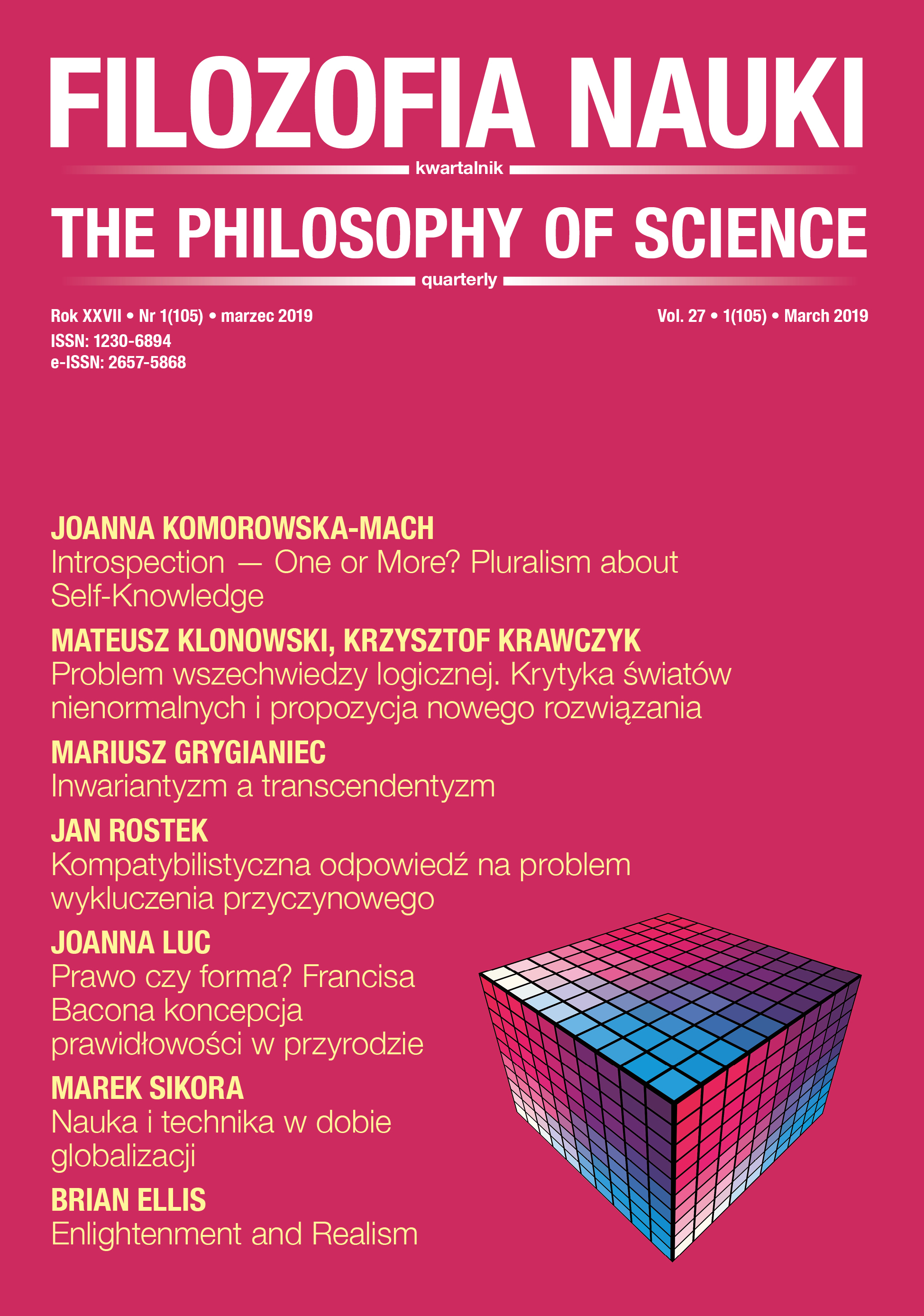Introspection — One or More? Pluralism about Self-Knowledge
DOI:
https://doi.org/10.14394/filnau.2019.0001Słowa kluczowe:
self-knowledge, introspection, pluralism, mental states, philosophy of mindAbstrakt
The aim of this paper is to provide a metaphilosophical analysis of the debate between monistic and pluralistic approaches to self-knowledge. I start by presenting the background for the discussion, clarifying the terminology, and drawing a distinction between moderate and radical pluralism. I then discuss and evaluate arguments for monism that appeal to general methodological guidelines as well as those relying on specific assumptions about the objects and character of self-knowledge. I offer a separate analysis of Eric Schwitzgebel’s radical pluralism, which threatens to undermine both monism and moderate pluralism. I close by describing a way of looking at the problem of the homogeneity of self-knowledge that goes beyond the monism–pluralism dichotomy and arguing that the heterogeneity and multidimensionality of the problem of self-knowledge are more important than the plurality of the solutions.
Bibliografia
Armstrong D. (1968), A Materialist Theory of the Mind, London: Routledge.
Baker A. (2016), "Simplicity" [in:] Stanford Encyclopedia of Philosophy (Winter 2016 Edition), E. N. Zalta (ed.), https://goo.gl/nW4avd.
Bar-On D. (2004), Speaking My Mind: Expression and Self-Knowledge, Oxford: Oxford University Press. https://doi.org/10.1093/0199276285.001.0001
Block N. (1997), "On a Confusion about a Function of Consciousness" [in:] The Nature of Consciousness, N. Block, O. Flanagan, G. Guzeldere (eds.), Cambridge, MA: MIT Press, 375-416.
Boyle M. (2009), "Two Kinds of Self-Knowledge," Philosophy and Phenomenological Research 78(1), 133-164. https://doi.org/10.1111/j.1933-1592.2008.00235.x
Boyle M. (2010), "Bar-On on Self-Knowledge and Expression," Acta Analytica 25(1), 9-20. https://doi.org/10.1007/s12136-009-0075-z
Brentano F. (2009), Psychology from an Empirical Standpoint, London-New York: Routledge.
Brueckner, A. (2011), "Neo-expressivism" [in:] Self-Knowledge, A. Hatzimoysis (ed.), Oxford: Oxford University Press. https://doi.org/10.1093/acprof:oso/9780199590728.003.0009
Burge T. (1988), "Individualism and Self-Knowledge," The Journal of Philosophy 85(11), 649-663. https://doi.org/10.5840/jphil1988851112
Butler J. (2013), Rethinking Introspection: A Pluralist Approach to the First-Person Perspective, Dordrecht: Springer.
Carruthers P. (2011), The Opacity of Mind: An Integrative Theory of Self-Knowledge, Oxford: Oxford University Press. https://doi.org/10.1093/acprof:oso/9780199596195.001.0001
Cassam Q. (2014), Self-Knowledge for Humans, Oxford: Oxford University Press. https://doi.org/10.1093/acprof:oso/9780199657575.001.0001
Chalmers D., Clark A. (1998), "The Extended Mind," Analysis 58(1), 7-19. https://doi.org/10.1093/analys/58.1.7
Coliva A. (2012), "One Variety of Self-Knowledge: Constitutivism as Constructivism" [in:] The Self and Self-Knowledge, A. Coliva (ed.), Oxford: Oxford University Press, 212-242. https://doi.org/10.1093/acprof:oso/9780199590650.003.0011
Coliva A. (2016), The Varieties of Self-Knowledge, London: Palgrave Macmillan. https://doi.org/10.1057/978-1-137-32613-3
Dąbrowski A. (2017), "Czym jest introspekcja? Badanie rozwiązań pluralistycznych," Analiza i Egzystencja 38, 39-66. https://doi.org/10.18276/aie.2017.38-03
Davidson D. (1984), "First Person Authority," Dialectica 38(2-3), 101-111. https://doi.org/10.1111/j.1746-8361.1984.tb01238.x
Davidson D. (1987), "Knowing One's Own Mind," Proceedings and Addresses of the American Philosophical Association 60(3), 441-458. https://doi.org/10.2307/3131782
Evans G. (1982), The Varieties of Reference. Philosophy (vol. 2), Oxford: Clarendon Press.
Fernandez J. (2003), "Privileged Access Naturalized," The Philosophical Quarterly 53(212), 352-372. https://doi.org/10.1111/1467-9213.00317
Finkelstein D. H. (2003), Expression and the Inner, Cambridge, MA: Harvard University Press.
Gertler B. (2010), Self-Knowledge, London: Routledge. https://doi.org/10.4324/9780203835678
Gertler B. (2012), "Renewed Acquaintance" [in:] Introspection and Consciousness, D. Smithies, D. Stoljar (eds.), Oxford: Oxford University Press, 93-127. https://doi.org/10.1093/acprof:oso/9780199744794.003.0004
Goldman A. (2006), Simulating Minds: The Philosophy, Psychology, and Neuroscience of Mindreading. Neuroscience, Oxford: Oxford University Press.
Hohwy J. (2013), The Predictive Mind, New York: Oxford University Press. https://doi.org/10.1093/acprof:oso/9780199682737.001.0001
Kim J. (1996), Philosophy of Mind. The Philosophical Review, Boulder, CO: Westview Press.
Komorowska-Mach J. (2015a), "Pojęcie introspekcji w psychologii potocznej," Przegląd Filozoficzny - Nowa Seria 24(3) [95], 75-89.
Komorowska-Mach J. (2015b), "Przypisywanie sobie emocji - wyrażanie czy wykrywanie? Elementy detektywistyczne w modelu neoekspresywistycznym," Filozofia Nauki (The Philosophy of Science) 23(4) [92], 41-54.
Langland-Hassan P. (2015), "Self-Knowledge and Imagination," Philosophical Explorations 18(2), 226-245. https://doi.org/10.1080/13869795.2015.1032329
Lewis D. (1973), Counterfactuals, Oxford: Basil Blackwell.
Locke J. (1975), An Essay Concerning Human Understanding, Oxford: Oxford University Press.
Lycan W. G. (1996), Consciousness and Experience, Cambridge: MIT Press.
Lycan W. G. (2004), "The Superiority of HOP to HOT" [in:] Higher Order Theories of Consciousness, R. Gennaro (ed.), Philadelphia: John Benjamins Publishers, 93-113. https://doi.org/10.1075/aicr.56.07lyc
Lyons W. (1986), The Disappearance of Introspection, Cambridge: MIT Press.
Moran R. (2001), Authority and Estrangement: An Essay on Self-Knowledge, Princeton: Princeton University Press. https://doi.org/10.1515/9781400842971
Moran R. (2012), "Self-Knowledge, 'Transparency,' and the Forms of Activity" [in:] Introspection and Consciousness, D. Smithies, D. Stoljar (eds.), Oxford: Oxford University Press, 211-236. https://doi.org/10.1093/acprof:oso/9780199744794.003.0008
Nichols S., Stich S. P. (2003), Mindreading, Oxford: Oxford University Press. https://doi.org/10.1093/0198236107.001.0001
Nisbett R., Wilson T. (1977), "Telling More Than We Can Know: Verbal Reports on Mental Processes," Psychological Review 84(3), 231-259. https://doi.org/10.1037/0033-295X.84.3.231
Piłat R. (2013), Aporie samowiedzy, Warszawa: IFiS PAN.
Prinz J. (2004), "The Fractionation of Introspection," Journal of Consciousness Studies 7-8, 40-57.
Putnam H. (1975), "The Meaning of 'Meaning'," Minnesota Studies in the Philosophy of Science 7, 131-193. https://doi.org/10.1017/CBO9780511625251.014
Renero A. (2018), "Modes of Introspective Access: A Pluralist Approach," Philosophia, 1-22. https://doi.org/10.1007/s11406-018-9989-2
Rorty R. (1970), "Incorrigibility as the Mark of the Mental," The Journal of Philosophy 67(12), 399-424. https://doi.org/10.2307/2024002
Rorty R. (1979), Philosophy and the Mirror of Nature, Princeton: Princeton University Press.
Rosenthal D. M. (2010), "Expressing One's Mind," Acta Analytica 25, 21-34. https://doi.org/10.1007/s12136-009-0078-9
Russell B. (1997), Problems of Philosophy, Oxford: Oxford University Press.
Schwitzgebel E. (2012), "Introspection, What?" [in:] Introspection and Consciousness, D. Stoljar, D. Smithies (eds.), New York: Oxford University Press, 29-47. https://doi.org/10.1093/acprof:oso/9780199744794.003.0001
Schwitzgebel E. (2016), "Introspection" [in:] Stanford Encyclopedia of Philosophy (Winter 2016 Edition), E. N. Zalta (ed.), https://goo.gl/47XmSb.
Seager W. (2002), "Emotional Introspection," Consciousness and Cognition 11(4), 666-687. Retrieved from https://goo.gl/Vkx95g. https://doi.org/10.1016/S1053-8100(02)00027-2
Shoemaker S. (1994), "Self-Knowledge and 'Inner Sense.' Lecture I: The Object Perception Model," Philosophy and Phenomenological Research 54(2), 249-269. https://doi.org/10.2307/2108488, https://doi.org/10.2307/2108489
Siewert C. (2012), "On the Phenomenology of Introspection" [in:] Introspection and Consciousness, D. Smithies, D. Stoljar (eds.), Oxford: Oxford University Press, 129-167. https://doi.org/10.1093/acprof:oso/9780199744794.003.0005
Smithies D. (2012), "A Simple Theory of Introspection" [in:] Introspection and Consciousness, D. Smithies, D. Stoljar (eds.), Oxford: Oxford University Press, 259-327. https://doi.org/10.1093/acprof:oso/9780199744794.003.0010
Wright C. (1998), "Self-Knowledge: The Wittgensteinian Legacy" [in:] Knowing Our Own Minds, C. Wright, B. Smith, C. Macdonald (eds.), Oxford: Oxford University Press, 101-122. https://doi.org/10.1017/CBO9780511563744.007, https://doi.org/10.1017/S135824610000432X



















 Filozofia Nauki | ISSN 1230-6894 | e-ISSN 2657-5868
Filozofia Nauki | ISSN 1230-6894 | e-ISSN 2657-5868